- Home
- Michael Chabon
Kingdom of Olives and Ash Page 3
Kingdom of Olives and Ash Read online
Page 3
That evening, my partner and I went back to our hotel room, turned on our computer, and exhaled to dispatches from the New Hampshire camp. Our children were safe. Our children were happy. But we were different now. With us, we carried those crying boys.
In the weeks before leaving, our family sat down to dinner each evening, inside our brownstone built in 1878, around a table that we had owned for four years, passing dishes that we could easily replace at Ikea should they become chipped or broken. We moved inside our bubble of comfort easily, save me, with my head halfway in a place that was as foreign and frightening as ignorance. As palpable as the daily news.
What I “knew” about Israel-Palestine was that it was a dangerous place, a place where buses full of people exploded at midday and small boys ran through the streets aiming semiautomatic weapons at innocent passersby. The Israel-Palestine I thought I knew was not a place nice Jewish women (my partner) step into and out of unharmed. I knew the Palestine-Israel of newspaper articles and television journalism. This Palestine-Israel was as foreign to me as Yemen, a place somewhere out there where people who had no connection to me fought among themselves—and killed others. People who were not 100 percent people . . . how could they be? They were outside my very comfortable America. Outside anything I could—or needed to—imagine. Daily reports of the devastation of the occupation fell on ears attuned more to domestic tragedies—the overshadowing of police brutality, my own people dying. If I couldn’t change this, what could I change? The reports again and again of Jews and Palestinians dying arrived to me in murky shadow. Bloodless. Boneless. These were not schoolchildren who begged for an extra sweet, not mothers lifting a breast to a newborn’s mouth. Not that same newborn instinctively lifting her head to meet it. No boys outside a checkpoint, gates locked, soldiers walking away. When will it open again? I asked the people with me. It could be hours. The soldiers decide. No. If I couldn’t save my own people, why even begin to imagine the murky shadows as fully human?
My own people dying.
What I know now is that there is no longer such a thing as one’s own people.
In Umm al-Khair, a Bedouin village in the South Hebron Hills, an artist named Eid Hthaleen served us sage tea in tiny, beautiful glasses. We sat on rugs underneath a large canopy, our shoes left just outside. In the hills beyond the tent, we could see his thin goats moving over the land. We could see the makeshift homes, built from tin and plastic and tarps. Beyond that, the piles of metal where soldiers had come in with orders to destroy the homes. Small children looked at me wide eyed. A dark man, nearly toothless, chain-smoked, his fingertips yellow. During a silence, he turned to me and asked through a translator, What is going on in your America? Why are they killing all the black people?
I couldn’t answer.
I do not know. Later, Eid took us to his studio, a tiny lean-to outside a small stone two-room home. He showed us the amazing trucks he had made—tiny renditions of the bulldozers and eighteen-wheelers that had come to destroy past homes, built from the materials and leftover metals of that destruction. This home, he said, was also under orders to be destroyed. All the structures were. He didn’t know where he’d go with his family from here. He didn’t know where the other families would go. They had been living on this land for over half a century. It’s land, Eid said. It will be here long after we’ve all stopped fighting over it.
Some mornings, when I’m feeling brave, I pull my black is beautiful T-shirt over my head—black shirt with white lettering; the people I pass either smile or glare or look surprised. My pro-Blackness is not antiwhite. This shirt isn’t my own middle finger thrown up into the air but rather an expression of my belief that love can exist for the self without annihilating others. Why is it I wear the shirt only when I’m feeling strong enough?
In Israel-Palestine, I meet both Israeli and Palestinian activists working hard toward creating a safer, freer, fairer nation. I take a bus to the Qalandiya checkpoint and watch the Palestinians moving slowly through it on their way to work. The checkpoint is a high structure of razor wire, iron bars, and metal detectors. IDs must be shown, and sometimes, for reasons no one can explain, people are not allowed to go through, losing days, sometimes weeks of work. A small white-haired Israeli woman, Hanna Barag, arrives early in the morning, to bear witness, to fight for the rights of the Palestinians, to help people move through their days, live their lives, feed their families. I watch her, see the hope in her actions, see the hope in the faces of the Palestinians who know who she is and why she’s there. The checkpoint reminds me of Comstock, Coxsackie, Elmira—the many prisons I saw as a child visiting my incarcerated uncle. In the heat of the early morning, I watch the people move slowly through, their heads bowed, their IDs held out hopefully—and I wonder what crime brought them to this moment. And I know, it is simply the crime of the accident of their birth. And the crime of a nation, of many nations, refusing to see people . . . as people.
In Hebron, a small red-haired Palestinian boy points to my hair and says It’s not real. Your hair isn’t real! I let him touch it and he yanks it hard. I do what any mother does. I yank his hair back. He is surprised. And then he laughs. I am as surprised by a red-haired Palestinian as he is by a brown-skinned Afroed woman. And then we aren’t surprised. We are just who we are.
I am one of three Black people on the plane to Israel-Palestine. A dark man with a yarmulke waves to me. Do you know him, the flight attendant wants to know. I smile at her, silent as bone, my back and voice tense for the journey. I am a mother. A partner. A writer. In Brooklyn, I have a life filled with people whom we share Sunday dinners with and have done so, with only a few misses, for fourteen years. We are well versed in Bordeaux and politics. We laugh a lot and comment on our children’s pituitary glands—how did this come to pass so quickly, that this one is taller than I am now and that one is about to graduate from high school, college, a master’s program? A voice comes over the intercom in Hebrew. My partner takes my hand, tells me again that her own parents used to fly in separate planes lest something happened and their three children were left parentless. And beyond the plane, I want to ask. What then?
The camp in New Hampshire has every auntie’s phone number from New York to Vermont to California. I remember again that we still haven’t gotten to our will. My sister will know what to do. Or maybe she won’t.
Memory is strange. As I write this months later, what I know is that my fear of Israel-Palestine, like so many fears, was one of ignorance, the unknown, the backstory of others brought into my own present. There is a quiet loveliness to the people of Palestine. Before you can remove your sandals and step into their homes, there is the offering of tea, the shy bowed heads of both the women and men, followed by the warm smiles often reflecting the tortured teeth of poverty. There is the deep heat of a moral core moving through the bodies of Israeli activists—a true belief in justice and equality for all people, a not-looking-away-ness from the pain that is this moment in Palestine-Israel. For many years, I stood outside these worlds. And then I stood inside my fear. Slowly, a bit reluctantly, I stepped inside, opened my eyes, touched, tasted, smelled, and pulled at the hair of a world I had tried to not see, to not know.
It’s not real, the boy said, pulling my hair. But like thirteen-year-old Ahmad Abdullah Sharaka, and twelve-year-old Tamir Rice, and eleven-year-old Abdul-Rahman Obeidallah and seventeen-year-old Dania Jihad Irshaid and eighty-four-year-old Marilyn May Bettencourt and the hundreds of Palestinians and African Americans killed between 2015 and 2016, my hair is as real as their bodies, as thick as their family’s grief, as dark as the blood that flows and continues to flow—from the United States to Israel-Palestine.
Bloated Time and the Death of Meaning
Ala Hlehel
The occupation deprives you of your humanity by depriving you of the ability to control time.
A free human being controls his time: he gets up when he wants and goes to bed when he wants; he goes to work according to a simple da
ily routine; she visits her relatives and her fiancé; he goes to the movies; she goes for a walk amid nature around her home any time she wishes. A human being is human because he makes his own decisions, because he has the ability to plan for tomorrow and the day after tomorrow, for next week and for the next ten years. A human being pursues her freedom through her ability to control her time. Freedom guarantees that simple, extraordinary, and sometimes hard-to-define thing: dignity.
The occupation is a machine: a complex, octopus-like regime that functions to exhaust those who are subject to it. It is a regime based on repression under the cover of administrative legitimacy, the courts, and legal authority. At first glance, everything is legal, and human rights are vouched for. A boy accused of throwing stones will enjoy legal representation in the military court, and an interpreter, and his mother’s right to weep yearningly in front of him for the four minutes the expeditious deliberation lasts in the reinforced plastic trailer. Tables, chairs, computers, soldiers male and female, secretaries, the national emblem, its flag, smart security cameras, a metal frame around the place where the accused are seated, a brown wooden podium behind which stands the defense attorney, white shirts with black neckties, an impatient military judge, and three young men in the prime of life who threw stones at a military jeep during a demonstration. Everything but justice.
The machine resembles an old clock with its cogwheels: each wheel turns and pushes the wheel interlocked with it to turn as well. Cogwheel turns cogwheel turns cogwheel, and so on. And so the occupation machine is so tightly wound, integrated, and coherent that it is hard to distinguish its beginning from its end. Who drives whom? Do the settlements drive the government, or vice versa? Do financial resources drive the ideology, or is it the other way around? Does the army drive the security justifications, or is it the other way around? Do the bypass roads drive settlement population growth, or is it the other way around?
Why do Palestinians throw stones at the soldiers’ and settlers’ vehicles? Because they are jealous of their wheels’ ability to turn endlessly in search of five-star bypass roads. It is a simple and human jealousy; the jealousy of those abandoned behind an illusory, unwritten line, watching life pass by at an insane pace. How does a Palestinian know life is passing by? By the endless red tile roofs, which stand out, stand out and increase, amid the verdancy of his confiscated land. The red tiles are in service to the occupation. They are the truest indicator of time, over fifty years of killing time. In a public square in a European town, a clever way of marking the passing of the daylight hours was invented: from within a huge clock emerged a metal soldier carrying a tiny pistol; he would mechanically raise his metal arm and fire one shot into the air as each hour struck, and then return into the clock. A creative idea to embody the concept of killing time. A clear and direct borrowing, which yet remains baffling in its power and the coldness of its metal; the occupation is a cold metal that kills with savage cruelty the most important thing life affords us: the finite seconds we are given once and once alone. The seconds which provide a direct, clear, and profound sense of our humanity.
In the writers’ tour I took part in, time was a decisive factor: when we left the hotel, when we would arrive, when we would rest, when we would drink coffee, when we would get out of the car, when we’d come back to it. A free man divides his time into definable units. That is what differentiates him from a prisoner languishing in a huge prison: the manacled prisoner does not divide his time into definable units. Time, to him, is waking and sleep. When sleeping, he sleeps, and when he is awake, he waits for sleep. And so time loses its meaning, but the greater tragedy isn’t that; it is that time’s losing its meaning becomes part of the routine, a routine that he even starts to accept. The occupation does not kill you with bullets, most of the time, but with the pistol of time. Military jeeps arrive at the entrance to the village and unholster the pistol of time, and fire a bullet at it every hour on the hour. That is how the occupation kills you.
The occupation kills time and deprives a Palestinian of his basic dignity as a human being. There is a crushing, fatal sadness in this. God alone (according to Jewish exegesis) exists outside time. “In the beginning” means before time was created. It is the moment when God created time as a vessel to contain existence. God was before the creation of this verse and will continue to exist after it. The settlers believe that they were here before the creation of the era of the occupation and will remain here after it. Maimonides taught that this verse’s meaning was that time becomes manifest to us through the movement of palpable substances, and if these substances had not begun moving, time would disappear.
Time here proceeds in a circular movement, and so it does not move, it does not advance. Man turns in vicious circles of circular time, and so he is like a rodent on a hamster wheel: he runs, standing in place. Palestinians, abandoned to the occupation, search for fresh ways of killing the time that does not pass. Time weighs heavily on you, becoming as heavy as a dark winter cloudbank. Time needs to be managed, maneuvered, and directed. A Palestinian in the West Bank faces time more often than he ever faces a tank or a rifle. We smoke outside the car and try to do the impossible that every smoker understands: holding the cigarette in your hand and keeping it lit at the same time. In these moments, in which three minutes are stolen to take refuge in your fleeting pleasure in the claws of fatal despair, we realize that a man can endure anything, if he holds to his little habits. They are the last indicators of his humanity. “We cultivate hope,” is what Mahmoud Darwish said about those subjected to the blockade.
Over the past few decades, settlers took over two buildings in Silwan in East Jerusalem, and that was the first spark in the great and manifold settlement operation, which we see today in more than ten buildings in Silwan and in the “City of David,” which was set up there as a site for ideological and religious tourism embodying quite simply the whole complex Zionist idea: a settler ideology with prominent colonial features under the cover of the Torah narrative. One of the settlers took revenge against his Palestinian neighbor by routing his sewer pipe by his house. “Living in the shit” went from slang to a highly pungent reality. The Palestinian homeowner took us into a small room in his house overflowing with sewage. The smell was hideous, but the truly sad and painful thing was the silent sorrow in his wide eyes as he told us with such spirit what the settlers had done to him. To whom should he complain, whom should he beseech?
An armored minibus moves into the neighborhood, escorted by border police officers bristling with weapons. A settlement barracks outside time and context. Life in the alley comes to a halt while the sons of the settlers returning from school climb out and go into the building, Yonatan’s Building, built there as tall as a middle finger aimed at them all. Suddenly you understand the meaning of “the right of self-determination,” which the Palestinians demand. It is simply the right to walk down the street by your house whenever you want, without being searched or pursued by security. The borders, the capital, the security arrangements, the control over resources, all of these abridge your ability to walk down the street by your house without being insulted or besieged or interrogated, and, most important, without giving up this simple right, the right to walk down the street without fear. The occupation drains your desire to live, to take chances, to walk at random down the street without a defined direction or plan specific enough to satisfy a soldier’s curiosity.
The occupation turns your joy in walking barefoot on the sandy beach into a luxury that a member of a struggling people cannot allow himself. The occupation reduces your joys and desires to the lowest point. That is how they triumph over you without firing a shot.
The soldiers ask you about everything. You must be convincing to get past the barrier or cross the checkpoint. There is no such thing as normal under the occupation. Everything must be exceptional, out of the ordinary, worthy of the soldier’s bothering to read your permit or search your luggage. The occupation turns your life into a series of excepti
onal moments between which stretch dead, passionless periods of time, filled with indolence, inactivity, and lack of desire.
Ofra: among the first settlements established by the Gush Emunim movement, in collusion with that dove of peace Shimon Peres. In 1977, the Likud Party came to power, and Ariel Sharon as a cabinet minister undertook to pursue the “swiss cheese” principle of settlements: a hole here and a hole there. With time, these holes cohered into a body, as the Palestinian body turned into holes. Palestinians became holes in the settlement body, an irritating thorn in the settlers’ ass, to borrow from a metaphor used by Education Minister Naftali Bennett. This game is fixed: he who possesses the power, control, and rule will become a body, and you, who lack these, will become a black hole. The Palestinian black hole has no element of time; as with any black hole, it obliterates, it hides you in your segregated streets and the segregated legal system and the segregated security measures.
With the ratification of the Oslo accords in 1993, the swiss cheese course further intensified: bypass roads, “legal and agreed upon,” were established to legitimize the settlements permanently, transforming these distant, remote places in frightful locations (holes) into suburbs convenient to Jerusalem and Tel Aviv from which one might come and go using roads restricted to Jews, modern streets (as in Europe or America), unlike the Palestinians’ streets (as in the Middle East), which increased the popularity of living there (in the body of the cheese). For that, you must guarantee freedom of movement for the new Jewish residents in the luxurious suburbs, and limit this freedom for the other side, so that the new residents of the suburbs feel safe and secure. How? By a number of basic means, including limiting the exits and entrances to and from the Palestinians’ towns and villages to only two for each town; and directing the Palestinian traffic toward the “must-use roads.” In this way the mouse can be kept inside the holes. He can go out only on orders and can come back only on orders. This was a win-win: control over these bothersome, overly possessive Palestinians, and a comfortable and economically beneficial suburban life for the new owners of the place.

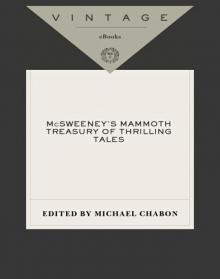 McSweeney's Mammoth Treasury of Thrilling Tales
McSweeney's Mammoth Treasury of Thrilling Tales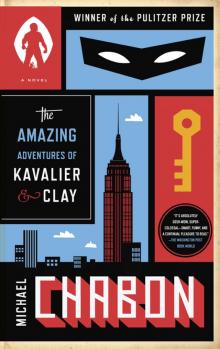 The Amazing Adventures of Kavalier & Clay
The Amazing Adventures of Kavalier & Clay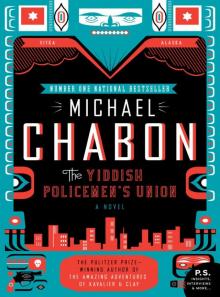 The Yiddish Policemen's Union
The Yiddish Policemen's Union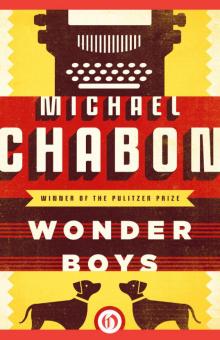 Wonder Boys
Wonder Boys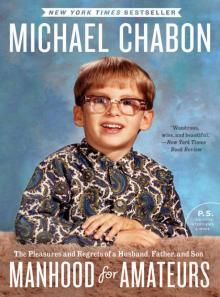 Manhood for Amateurs
Manhood for Amateurs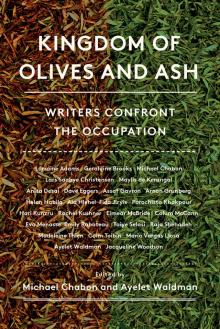 Kingdom of Olives and Ash: Writers Confront the Occupation
Kingdom of Olives and Ash: Writers Confront the Occupation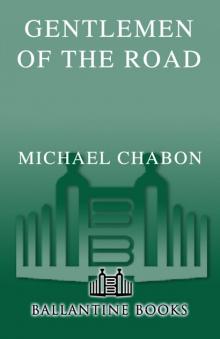 Gentlemen of the Road: A Tale of Adventure
Gentlemen of the Road: A Tale of Adventure A Model World and Other Stories
A Model World and Other Stories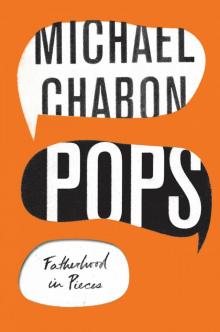 Pops: Fatherhood in Pieces
Pops: Fatherhood in Pieces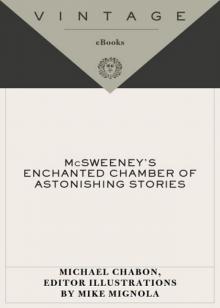 McSweeney's Enchanted Chamber of Astonishing Stories
McSweeney's Enchanted Chamber of Astonishing Stories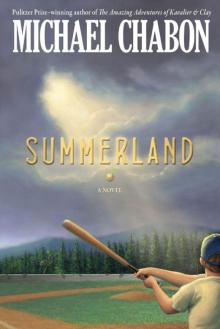 Summerland
Summerland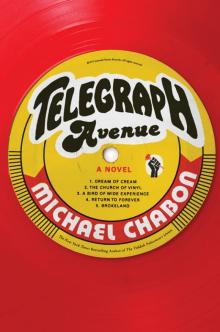 Telegraph Avenue
Telegraph Avenue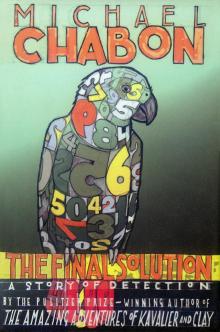 The Final Solution
The Final Solution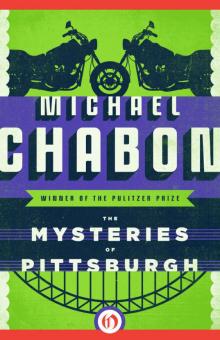 The Mysteries of Pittsburgh
The Mysteries of Pittsburgh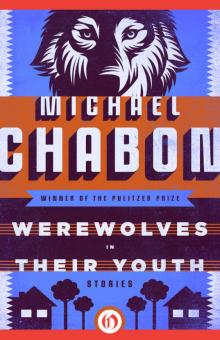 Werewolves in Their Youth
Werewolves in Their Youth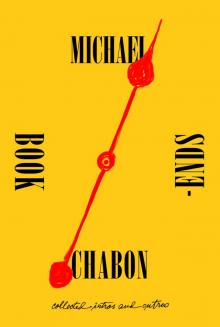 Bookends
Bookends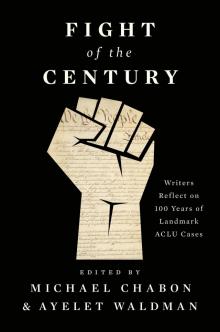 Fight of the Century
Fight of the Century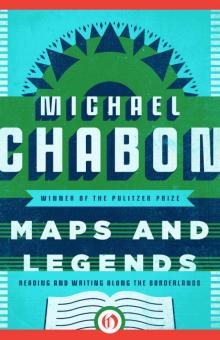 Maps and Legends
Maps and Legends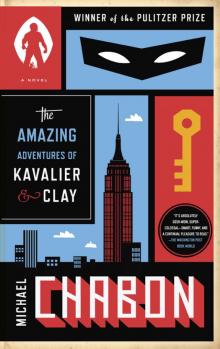 The Amazing Adventures of Kavalier & Clay (with bonus content)
The Amazing Adventures of Kavalier & Clay (with bonus content)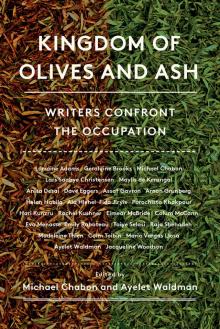 Kingdom of Olives and Ash
Kingdom of Olives and Ash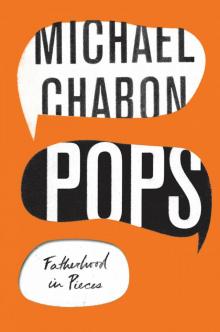 Pops
Pops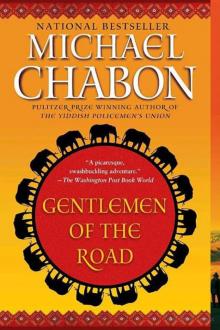 Gentlemen of the Road
Gentlemen of the Road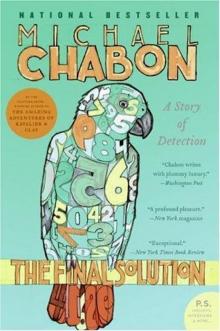 The Final Solution: A Story of Detection
The Final Solution: A Story of Detection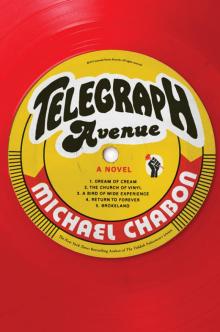 Telegraph Avenue: A Novel
Telegraph Avenue: A Novel